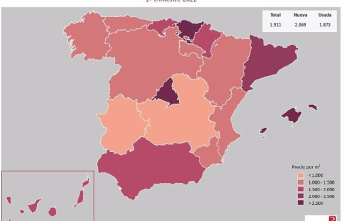In Spain there are almost 8 million people who smoke daily and another 928,000 who do so occasionally, according to a survey carried out by the Spanish Association Against Cancer (AECC), which also indicates that another 8.8 million Spaniards declare themselves ex-smokers. The age group with the most smokers is between 25 and 34 years of age in men, and between 45 and 54 years of age in women. And the autonomous communities with the highest percentages of daily smokers are Extremadura, the Region of Murcia and Andalusia, while the ones with the least are Melilla, the Basque Country and Madrid.
The AECC survey also indicates that tobacco consumption among people from lower social strata is almost double that of upper class people, and daily exposure to tobacco smoke indoors among the lower classes is almost three times higher , which implies a "significantly" high risk of developing lung cancer, among others. By social class, 23% of workers in the primary sector smoke, almost double that in the segment of directors and managers and professionals traditionally associated with university degrees (12.56%)
On the other hand, more than half of the smokers (54%) declare that they smoke a lot or quite a lot in the presence of minors while they are on open terraces, or in the street. Nearly 40% also smoke indoors regularly while their children are nearby, and one in four smokes inside their vehicle.
The survey, carried out among 2,000 fathers and mothers with minor children to assess the risks associated with tobacco smoke, shows that 86% of those interviewed value the anti-smoking law, which provides for a ban on smoking on the terraces of bars and restaurants, in sports stadiums, and in parks and beaches, as a "good or very good" initiative, being especially positive in the case of women and people of higher age groups. Even among smokers, two out of three value it positively or very positively.
According to the survey, 70% of the population agrees that we must think about the health of passive smokers, 63% are concerned about the polluting effect that cigarette butts have on beaches, and 58% directly support that the administration want to expand the number of smoke-free spaces. Two out of three people rate the creation of these new smoke-free spaces very positively (with a 9 or 10 out of 10), although the percentage drops to one out of three in the case of smokers.
7












